Introduction, Specifications, and Pricing
The HP EX920 has been the "it" NVMe SSD for most of the summer. The series was first on display at CES in January 2018 and by early May in warehouses with attractive pricing compared to Samsung's 970 offerings. Prices have dropped across the board for all SSDs since then. Today we see if the HP EX920 is still the best NVMe value and we do it in all three capacities.
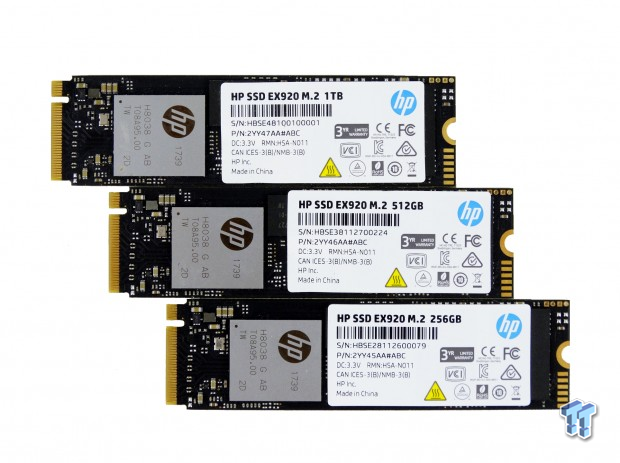
HP is a brand you know, but these drives don't come from the same Hewlett-Packard your notebook comes from. A company called Biwin licenses the brand to sell SSDs under the HP name. Biwin is a large SSD manufacturer that manufactures several popular SSDs that sell under different names across the world. The HP-branded drives must meet a robust series of tests dictated by HP. Each drive goes through a certification process by the big HP Company to work with its servers, desktops, and notebooks. When you buy an HP-branded SSD, it's going to work in your HP system. The EX920 is an NVMe product, so your system has to support the protocol, but other than that little detail, it's going to work.
The drives will also work in other PCs outside of the HP ecosystem. Most of you reading this build your own PCs and the EX920 is an inclusive product rather than an exclusive product.
Using the HP name, Biwin has released a number of exciting products. We recently tested the Portable SSD P800, one of the early Thunderbolt 3 drives armed with a high-speed NVMe SSD inside. The company also have mainstream offerings like the EX900 DRAMless NVMe SSD, and the S700 Pro and S700 for SATA shoppers.
At this point, we've seen enough of these drives to be comfortable recommending them. HP is also comfortable enough with the EX920 series that it increased the warranty and endurance ratings to give users more peace of mind, and a bit more value.
Specifications
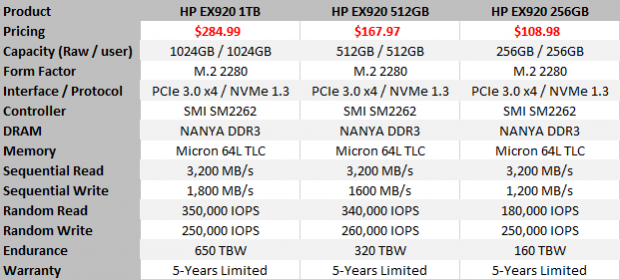
The EX920 series ships in three sizes from 1TB to 256GB with a stop in the middle at 512GB. HP gives users the full binary capacity so a 1TB drive has the full 1024GB without any additional overprovisioning often used to increase performance under heavy workloads.
The paper performance ratings come to 3,200 MB/s sequential read and between 1,800 and 1,200 MB/s sequential write speeds. Random read performance scale between the three sizes as well. The 1TB model can read at 350,000 IOPS, and the 512GB can achieve 340,000 IOPS. The smallest drive in the series drops that performance down to 180,000, but all of these numbers come from high queue depth tests that mean nothing to your real-world performance. We will show you that today with the EX920 outperforming SSDs rated for 500,000 IOPS random read performance.
The high performance comes from two critical parts that crossed paths at the right time. Silicon Motion, Inc. (SMI) built a very strong 8-channel controller with the SM2262. At the same time, Micron improved on its 3D technology when it stacked 64 layers together. The combination is nothing less than remarkable considering the previous generations of both technologies had us worried about both companies long-term survival. This new generation corrected ever performance issue and produces an excellent user experience.
Pricing, Warranty, And Endurance
With a few months of availability, the HP EX920 prices have decreased slightly but not as much as other products with the SMI SM2262 controller. The EX920 1TB currently sells for $284.99 while the EX920 512GB sells for $167.97, both prices from Amazon. The smallest drive in the series sells for $108.98.
The EX920's closest rival comes from Adata in the SX8200. Adata has been more aggressive with the price cuts since the series came to market. The SX8200 960GB sells for $264.99, and the 480GB sells for $137.99. The SX8200 240GB is all the way down to $77.99, but as you can see, all of these drives give you less user capacity due to overprovisioning.
As we mentioned in the introduction, HP increased the warranty period and endurance rating on this series. The EX920 now carries a full 5-year warranty with endurance ratings of 650, 320, and 160 terabytes written (TBW).
A Closer Look
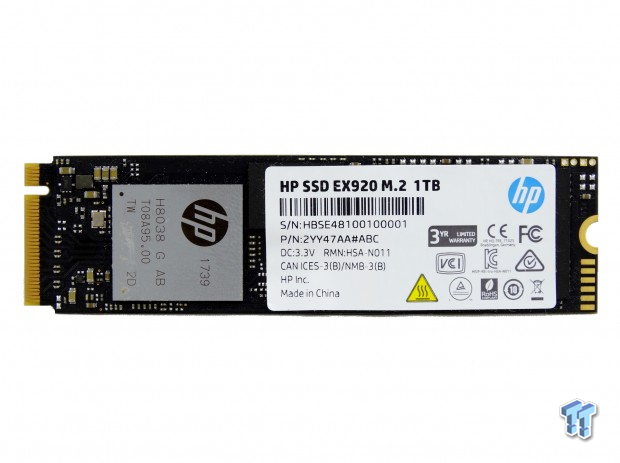
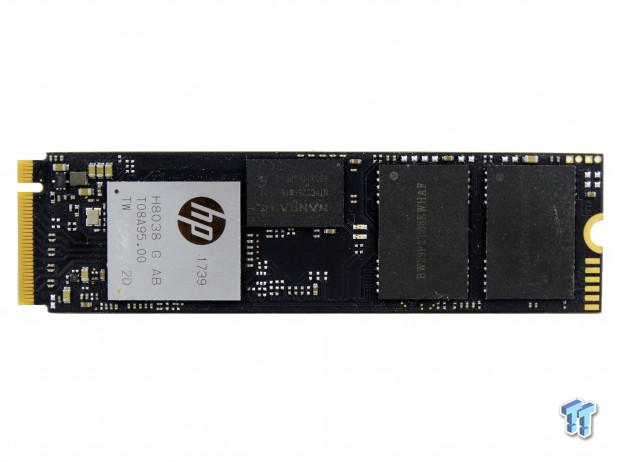

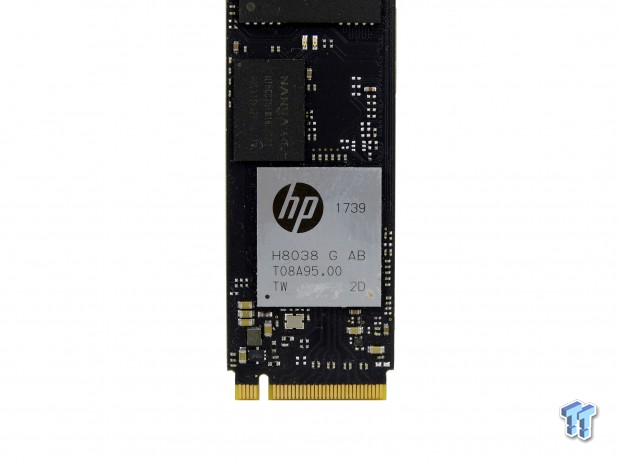

All three of our drives still have the older label showing a 3-year warranty, but the new drive shows a 5-year warranty. The SMI SM2262 controller features a nickel-plated copper strip to increase thermal dissipation. The metal spreads the heat out from the center; the physical controller is actually located under the plastic-like material.
1TB Class Performance Testing
Product Comparison

There is a lot to talk about today with three capacities to go over. We start with the 1TB models where the EX920 will go head-to-head with the Adata SX8200 using the same controller and flash. The SX8200 reserves more capacity for background tasks than the EX920 that gives users the full 1024GB of space.
The Intel 600p joins in the fun. This was the go to low cost 1TB SSD for much of 2017 and one of the few entry-level NVMe products to ship in this size. The Plextor M9Pe came to market around the same time. It features 64-layer memory but a first generation Marvell NVMe controller.
The two Samsung 970 SSDs featuring 64L V-NAND and the Phoenix controller, possibly the most advanced ever released for consumer SSDs, don't need an introduction. The EVO uses 3-bit per cell flash and the Pro uses 2-bit per cell flash.
The SanDisk Extreme Pro NVMe is actually the newest of the drives in the charts today. The Extreme Pro features Western Digital's first in-house NVMe controller with the company's 64L TLC.
Sequential Read Performance
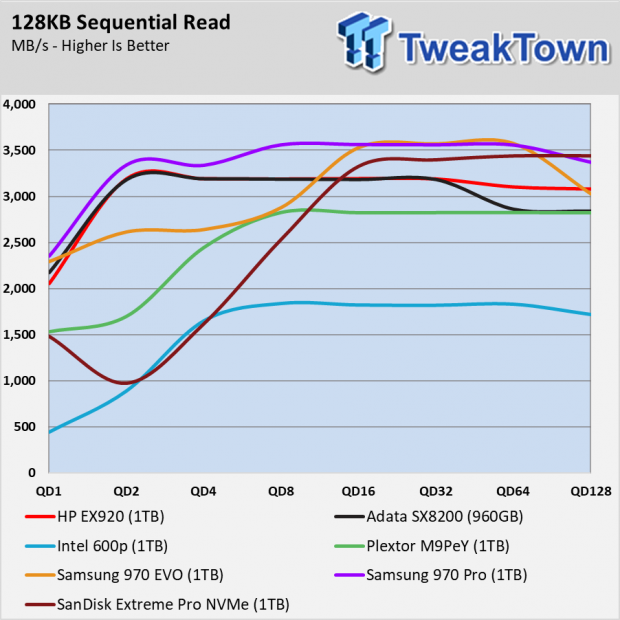

The 1TB HP EX920 starts to read sequential 128KB block size data at over 2,000 MB/s. This is a very high number that is in the same realm as the two Samsung 970 series SSDs. The EX920 scales well as we increase the queue depth (QD) workload. At QD2 the drive is almost as fast as the 970 Pro.
Sequential Write Performance


Writing sequential data is a bit slower than reading it on the 1TB EX920. The drive turns in a quick performance but its around 1,000 MB/s slower than the two Samsung drives and the SanDisk Extreme Pro NVMe in the burst test.
Sustained Sequential Write Performance

The sustained write difference compared to the Adata SX8200 with overprovisioning. Adata takes the reserved space to give users more SLC buffer space and the EX920 just gives the space to users to keep data on. Both drives write a lot of data close to 1,500 MB/s in the buffer, but the HP has a higher native TLC speed.
Random Read Performance
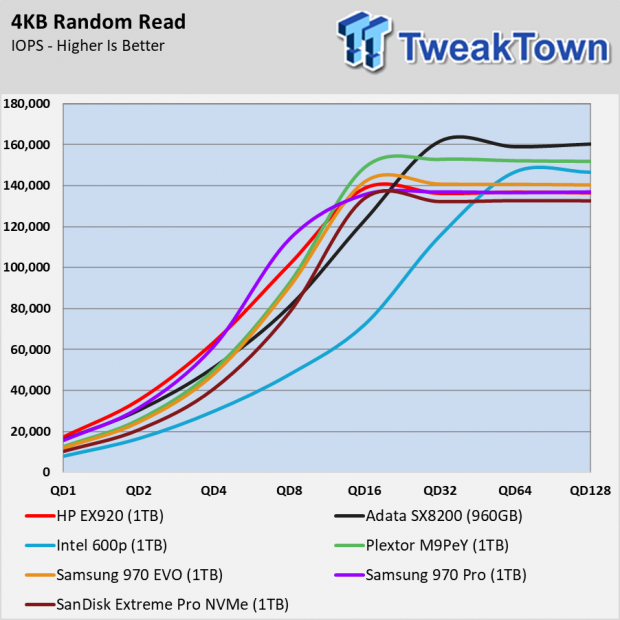

The EX920 has the highest QD1 random read over any flash-based SSD we've tested. The Optane SSDs are faster but use an exotic memory that makes them expensive.
Random Write Performance


Like the sequential write test, the 1TB EX920 falls below many of the other drives in the random write test. This is less of a concern for users in the SLC buffer age because the drives are all so fast that it's difficult to see the differences in real-world use.
70% Read Sequential Performance


The EX920's lower sequential write performance doesn't allow the drive to reach the high mixed workload speeds in this test at moderate queue depths, but the drive dominates the QD2 test.
70% Read Random Performance


The 1TB EX920 also dominates the QD2 random mixed workload test thanks to the drive's blisteringly fast random read performance.
1TB Class Real-World Performance Testing
Game Load Time

This series gained a following when released thanks to its application performance and low latency. Our game load time test with Final Fantasy: Stormblood shows how the high random read performance and optimized background flash management allow the drive to load the game faster than any other flash-based SSD we've tested.
PCMark 8 Total Storage Bandwidth

When it comes to general application performance, the 1TB HP EX920 tops all but the Samsung 970 Pro, a high-performance workstation class SSD with MLC flash.
PCMark 8 Extended Storage Test
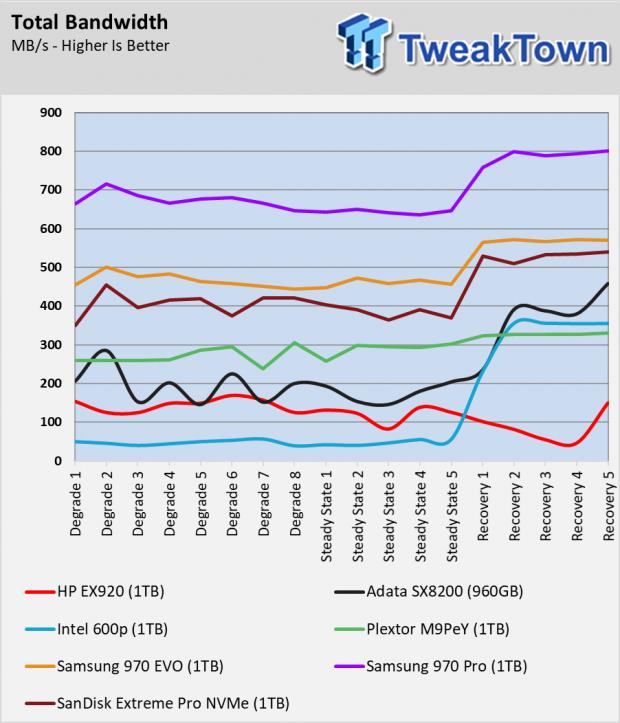
We suspect the EX920 fell short of the 970 Pro's performance due to the way it handles repetitive workloads. The EX920's performance degrades quickly as we write data to the drive. It takes longer to recover than most of other drives.
SYSmark 2014 SE System Responsiveness and Power Tests
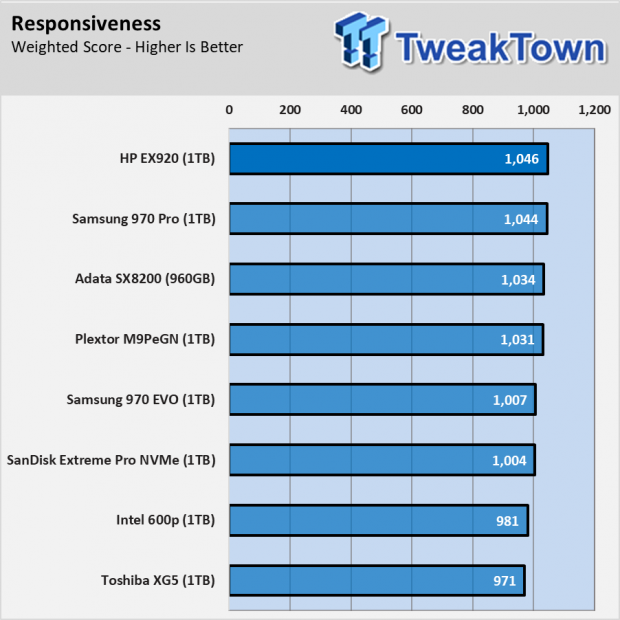

This drive's high random performance allows it to reach the top of the Responsiveness Test built into BAPCo's SYSmark 2014 SE software. This is a direct measurement of the user experience. The drive is also very efficient with power. The watt-hour rating is for the entire system and not just the drive.
Notebook Battery Life

The high efficiency comes through in our Lenovo Y700-17 notebook running BAPCo's MobileMark 2012 1.5 software. The 1TB EX920 only trails the older Intel 600p with the drives we compared it against.
512GB Class Performance Testing
Product Comparison

There are a few changes in the 512GB NVMe class. The 970 Pro is out; most workstation users want more capacity. Lower capacity drives fall automatically into mainstream classes unless they cost significantly more than other products, like the 970 Pro to the models on this page. The cost difference between an entry-level, mainstream, and premium NVMe in this capacity is minimal.
Sometimes through the number of products sold, the prices even reverse. The HP EX900 500GB is the lower tier NVMe SSD from HP. We sometimes see the EX920 premium SSD selling for less than the EX900. The MyDigitalSSD SBX and Toshiba RC100 round out the more affordable options.
The Samsung 970 EVO and Intel SSD 760p with a Silicon Motion SM2262 controller, complete the comparison list.
Sequential Read Performance


The Adata and HP EX920 again show similar performance as we escalate the workload with queue depth requests. You will quickly notice that the Intel SSD 760p does not mimic the two popular drive even though all three feature the same controller and the flash comes from the same manufacturing facility.
Sequential Write Performance
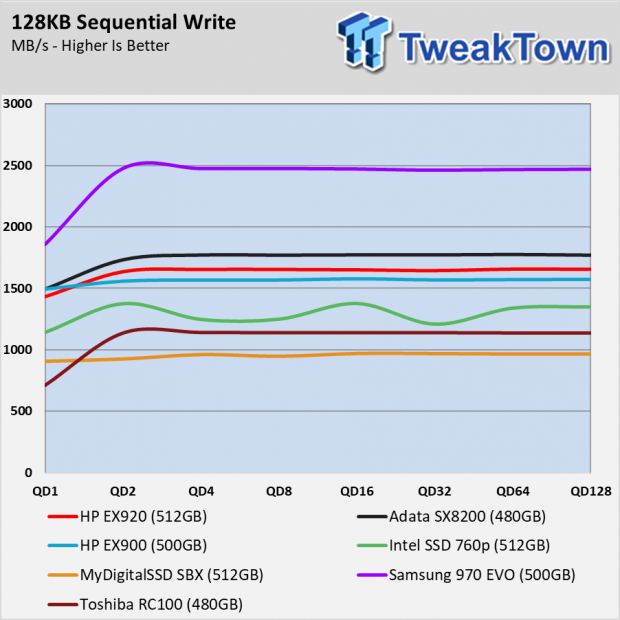

I've always felt it critical to compare different capacities. The behavior changes with each capacity as we change the DRAM size and the number of NAND die with each architecture.
In the 512GB class, the extra reserve area implemented in the SX8200 allows the drive to write large block size sequential data a little faster than the EX920. Both drives start off very strong with right around 1,500 MB/s, but are 400 MB/s slower than the Samsung 970 EVO 500GB. As we scale the workload, the gap between the EVO and the EX920 increases in burst writes.
Sustained Sequential Write Performance

The EX920 has a larger SLC compared to the 970 EVO, but both use a dynamic size that changes with the amount of data on the drive. The SX8200 has a larger cache compared to both. The performance after the SLC buffer can be a concern for some users. If you transfer a lot of data to your drive from another high-speed source, you want a very large buffer or high sustained write performance. The EX920 has higher sustained performance than the Adata, but still trails the 970 EVO.
Random Read Performance


In the 1TB class, the EX920 dominated the random read tests at low queue depths. The same holds true in the 512GB class. The EX920 512GB doesn't reach the same 17,000+ IOPS as the larger drive, but with nearly 15,500 IOPS at QD1 you won't notice.
Random Write Performance


The 512GB EX920 performs better in relation to the other drives than we saw with the larger capacity models when it comes to random writes. That doesn't mean a lot looking at pure random writes, but it means much more with mixed workloads and the way applications feel.
70% Read Sequential Performance


Before we dive into the random mixed workloads, we first look at using 70% reads with sequential data. The EX920 and SX8200 both trail the 970 EVO but show a clear performance increase over the 760p with a less aggressive firmware.
70% Read Random Performance


For some shoppers, these charts look like lines on a page, but we need to see the synthetic performance to understand why one SSD outperforms the other in real-world applications. For others, the synthetic performance already tells you how each drive will operate in applications. The 512GB HP EX920 shows strong performance at low queue depths and a heavy emphasis on delivering excellent random performance that applications, and Windows, relies on.
512GB Class Real-World Performance Testing
Game Load Time

Moving into the application performance portion of the HP EX920 512GB coverage we see the mid-capacity doesn't perform as well as the larger drive in relation to the other SSDs in this size. The Adata SX8200 just squeaks past the EX920 in our game load time test. The two are so close you wouldn't actually see a difference, even with a stopwatch. The Intel SSD 760p is right in the hunt for the top honor as well.
PCMark 8 Total Storage Bandwidth

The general software performance test with ten commonly used applications shows the EX920 back on top, and many of the other drives close behind.
PCMark 8 Extended Storage Test

With less flash to clean from a dirty state, the 512GB EX920 recovers faster than the 1TB we tested. In the PCMark 8 Extended Storage Test, we see the recovered performance a little better. The Adata SX8200 gives us a better look. It has the reserved space, and that helps to recover faster. The EX920 does eventually recover, just not in the five-minute gaps this test provides between each recovery pass.
SYSmark 2014 SE System Responsiveness and Power Tests


The 512GB EX920 leads this capacity in the SYSmark 2014 SE Responsiveness Test. Even though the win is by a single point over the Adata SX8200, this really goes to show that the EX920's performance isn't just a fluke with one capacity. There is always some wiggle room between capacities; the drives are not the same. Case in point, the 512GB does is poor in the power efficiency test when we compare it to the other products. The 1TB EX920 was at the top of the system power chart.
Notebook Battery Life

You can't look at the 1TB EX920 result in our Lenovo Y700-17 gaming notebook and just assume the 512GB model performs just as well. There is only a 15-minute difference between the 1TB and 512GB EX920, but if this is what you care about for business travel, you need to look at the other products around the same budget.
256GB Class Performance Testing
Product Comparison

The margin between the most expensive and least expensive 256GB class SSDs is so small that users should only look at the fastest drives available when shopping. These drives have a quarter the number of die compared to the 1TB models, and the write performance can get dicey here due to limited parallelism. It's possible to see SATA SSDs with more write performance than some of the drives, but the read performance over PCI Express is impossible to beat with the older 6Gbps interface.
Sequential Read Performance


Starting out with the sequential read test, the 256GB EX920 and SX8200 show identical performance through the QD range. The Intel SSD 760p and Samsung 970 EVO are close to the two other drives with the EVO taking some wins at different queue depths.
Sequential Write Performance


The 256GB EX920 has a very linier burst sequential write that doesn't seem affected by simple queue depth increases.
Sustained Sequential Write Performance

We see the same sustained write performance from the different architectures as we spotted with the larger drives. The EX920 doesn't have large cache that the SX8200 has, but gives users more space for data.
Random Read Performance


With the 256GB class, we see the low queue depth random read performance regress from what the large capacity drives give. The EX920 still performs very well in this test, but you can't expect the application performance to be the same across the capacities.
Random Write Performance


We expected to see some of the 256GB drives to have a difficult time with the random write test, but the SLC buffers work to keep the performance high.
70% Read Sequential Performance


The sequential mixed workload performance is down from the larger models but the issue spans all NVMe SSDs.
70% Read Random Performance


If you were to go back in time and look at older SSDs, you would see that just a few years ago 10,000 random mixed IOPS was a very good result. NVMe and the new flash has raised the bar very high. The EX920 has the highest recorded QD2 random mixed performance we've tested with a 256GB flash-based SSD.
256GB Class Real-World Performance Testing
Game Load Time

The high random mixed performance is what makes the 256GB EX920 so fast in applications tests. Just a year ago, the MyDigtialSSD BPX with MLC flash and a low price point blew us away. In a little over a year the EX920, with TLC flash, shaved more than a second off the Final Fantasy: Stormbood load time.
PCMark 8 Total Storage Bandwidth

The BPX is still a helluva drive. The MLC flash allows it to keep sustained write performance very high and in some media applications it's a nice, speedy, attribute to have. The BPX and MLC flash have both sold out and will never return, and now it's time to let the next generation shine. The 256GB EX920 is the best of this generation.
PCMark 8 Extended Storage Test

With the 1TB and 512GB drives, we never saw the EX920 fully recover in the five-minute idle time. We stated the drives do eventually recover and that we would show it in a later test. The 256GB drive with less flash to clean shows the recovery performance. The larger drives simply need more time after being hammered for hours with small block size data writes.
SYSmark 2014 SE System Responsiveness and Power Tests


Again we see the Adata, and HP drives with the SM2262 controller just one point apart in the BAPCo SYSmark 2014 SE Responsiveness Test. In the efficiency portion of the test, the EX920 rises near the top, and that should carry over to the battery life test in the next section.
Notebook Battery Life

As predicted, the Lenovo Y700-17 armed with the HP EX920 256GB delivers very good on-battery time. The MyDigitalSSD SBX is a better choice if you need to spread every electron out but the EX920 delivers a better user experience.
Final Thoughts
The HP EX920 was the "it" NVMe SSD of the summer but some things have changed since it gained notoriety just after CES. The EX920 is still an excellent SSD today but you have to pay slightly more to harness the last few drops of performance. In the real-world, you likely wouldn't see a difference.

The EX920 was the first retail SSD we saw with the SM2262 controller. HP worked up a custom firmware that gave this series explosive performance that Intel, Adata, and others with the same controller couldn't match in most capacities.
Now in our last days of summer, the EX920 still leads the SM2262 drives in performance but HP's smaller role in the European and American SSD markets hasn't allowed the company to scale pricing as aggressively. The short story on this is one we've told before over the years. If you want the extra performance, you have to pay a little more for it.

 United
States: Find other tech and computer products like this
over at
United
States: Find other tech and computer products like this
over at  United
Kingdom: Find other tech and computer products like this
over at
United
Kingdom: Find other tech and computer products like this
over at  Australia:
Find other tech and computer products like this over at
Australia:
Find other tech and computer products like this over at  Canada:
Find other tech and computer products like this over at
Canada:
Find other tech and computer products like this over at  Deutschland:
Finde andere Technik- und Computerprodukte wie dieses auf
Deutschland:
Finde andere Technik- und Computerprodukte wie dieses auf